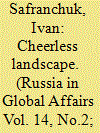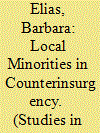| Srl | Item |
| 1 |
ID:
146260


|
|
|
|
|
| Summary/Abstract |
U.S. presidential elections are invariably accompanied by talk about the possibility of turning a new page on some essential political issue or even policy course. In fact, a new administration and policy line is more than guaranteed if the incumbent is not in the presidential race. Today U.S.-Russia relations have plummeted to a low not seen since the end of the Cold War or possibly even earlier. Yet chances for better relations between the two countries when the 45th U.S. president takes office are slim. Indeed, they will remain so at least as long as the current unfavorable situation continues.
|
|
|
|
|
|
|
|
|
|
|
|
|
|
|
|
| 2 |
ID:
181735


|
|
|
|
|
| Summary/Abstract |
In counterinsurgencies, minority groups such as the Sunnis in Iraq are important elements of the “population,” the social–political terrain where population-centric counterinsurgency is battled. Yet there has been little systematic analysis of minority groups in unconventional warfare and no investigation of the ways intervening forces, like the United States, have approached in-country allies in an effort to get host nations to address the strategic importance of minorities. Examining new data on alliance politics between the United States and local partners in Vietnam and Iraq, I find that while existing scholarship would suggest that in-country allies will resist U.S. pressure to engage with minority groups, local allies are surprisingly likely to comply, at least in part, in order to avoid U.S. unilateral engagement with local minorities and to influence the policies adopted. This process slowly undermines U.S. counterinsurgency efforts, speaking to the complexities of population-centric approaches and working through local proxies.
|
|
|
|
|
|
|
|
|
|
|
|
|
|
|
|